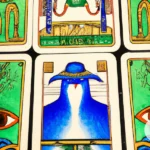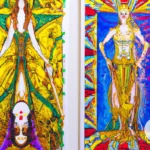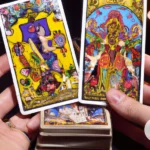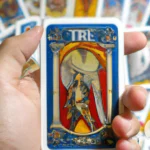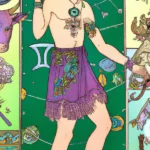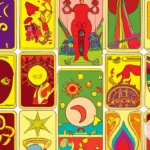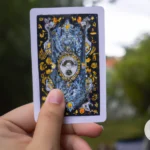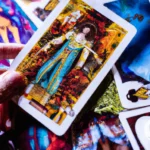The world of tarot cards can be both fascinating and mystifying, as these cards hold the potential to dive into the depths of our psyche and reveal hidden truths about ourselves. Among the many types of tarot decks, the Thoth Tarot Deck stands out as a unique and captivating tool for self-discovery and reflection. Created by the infamous occultist Aleister Crowley, this deck is deeply rooted in his unique philosophy and artistic vision. In this article, we will explore the life and legacy of Crowley, the origins of the Thoth Tarot, and how to use this deck to gain insight and wisdom. We will also delve into the symbolism and meanings behind the individual cards, learn how to read the Thoth Tarot accurately and creatively, and discover the paths to develop our own intuition and reading skills. If you are ready to step into the mysterious and magical world of Thoth Tarot, then let’s begin this journey together.
Aleister Crowley: The Creator of Thoth Tarot Deck
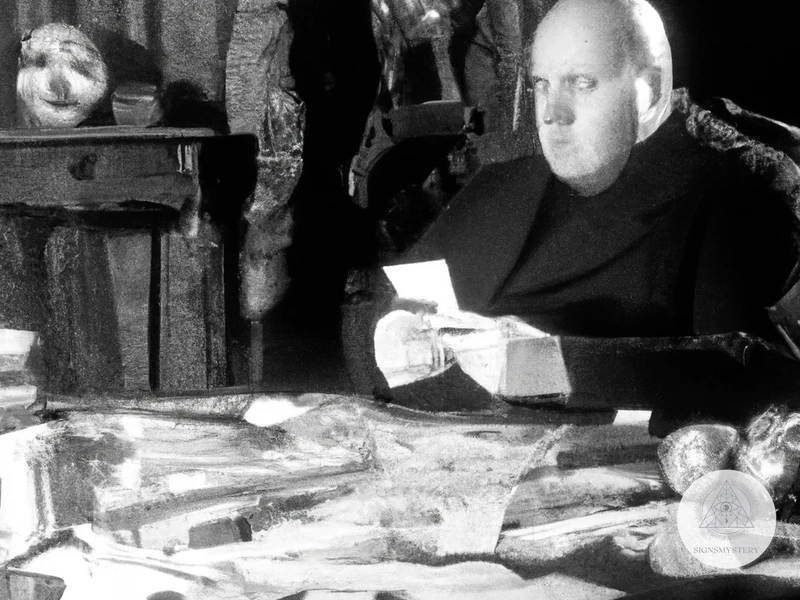
The Thoth Tarot Deck is one of the most well-known and respected tarot decks in the world, and it was created by the infamous and controversial Aleister Crowley. Crowley was not only a powerful occultist and mystic, but also an accomplished poet, writer, and artist. His contributions to the world of esotericism and the occult are vast and varied, and the Thoth Tarot Deck stands as one of his greatest and most enduring legacies. In this section, we will explore the life and works of Aleister Crowley as they relate to the creation of the Thoth Tarot Deck, including his philosophical influences and artistic inspirations. To learn more about the Thoth Tarot Deck and its unique features, you can check out our guide to the Major Arcana here, or read about the Minor Arcana here.
Crowley’s Life and Legacy
Aleister Crowley, a famous philosopher, and occultist, is the creator of the Thoth Tarot Deck. Born in 1875 in England, Crowley was drawn to various mystical practices from a young age. He was a member of the Hermetic Order of the Golden Dawn, a mystical society that helped him develop his magical worldview.
Throughout his life, Crowley gained a reputation as a controversial figure due to his experiments with sex magic and drug use. However, he is also regarded as a brilliant and innovative thinker, influencing many modern occult practices.
Crowley’s Legacy
Crowley’s influence on modern occultism is significant, and he is considered to be one of the most important figures in the Western Esoteric Tradition. His unorthodox approach to spirituality has led to his work being both celebrated and controversial. Crowley’s philosophy focused on individualism, indulgence, and personal responsibility, which aligned with his view of the universe as a divine, interconnected being.
Crowley’s contribution to the Thoth Tarot Deck
Crowley was inspired to create his own tarot deck after studying the works of the Golden Dawn, which included the use of tarot cards. However, he felt that the existing tarot decks lacked sufficient depth and that their symbolism was outdated. Crowley set out to create his own deck that accurately represented his unique, avant-garde spiritual philosophy.
Crowley collaborated with artist Lady Frieda Harris to develop the Thoth Tarot Deck. Their collaboration was a significant achievement, as Harris brought a modern, artistic approach to the deck’s illustration, while Crowley added his deep spiritual insights.
Despite the controversy surrounding Crowley’s life and work, the Thoth Tarot Deck has become a beloved tool for tarot enthusiasts around the world. Its innovative design and deep symbolism continue to inspire individuals to explore their spiritual path through divination.
If you want to learn more about the connections between astrology and the Thoth Tarot Deck, check out our article on Thoth Tarot and Astrology.
Philosophy behind the Thoth Tarot
The Thoth Tarot deck was designed to incorporate various philosophical and esoteric ideologies, all of which played a significant role in the thinking of its creator, Aleister Crowley. The deck’s philosophy is rooted in the belief that everything in life has both an external and internal reality, and that it is possible to harmonize these two realities through the use of tarot cards. Crowley believed that the tarot deck has the power to reveal hidden truths and secrets about ourselves and the world around us.
One of the main philosophical frameworks behind the Thoth Tarot deck is the concept of Thelema, which refers to a personal belief system that encourages individuals to discover their true will and follow it without reservation. Crowley developed this philosophy in the early 1900s, and it quickly became a central tenet of his work with the tarot. As a result, many of the cards in the Thoth Tarot deck contain references to Thelema or similar ideologies.
Another significant philosophical influence on the Thoth Tarot deck was the Kabbalah, an esoteric Jewish tradition that focuses on the study of the Torah and the discovery of spiritual truths. Crowley was deeply influenced by the Kabbalah and incorporated many of its concepts into the design of his tarot deck. For example, each of the Major Arcana cards corresponds to a specific path on the Kabbalistic Tree of Life, which is a diagram that represents the different levels of human consciousness and spiritual development.
The Thoth Tarot deck also draws on other philosophical and artistic influences, including the teachings of ancient Egyptian mysticism, the principles of alchemy, and the work of various surrealist artists. The imagery and symbolism used in the deck are intended to be multi-layered and open to interpretation, allowing readers to access deeper levels of meaning and understanding.
Ultimately, the philosophy behind the Thoth Tarot deck is one of self-discovery, transformation, and personal growth. Whether used for divination or meditation, the cards are a powerful tool for exploring the hidden aspects of ourselves and the world around us. To learn more about the connection between the Thoth Tarot and the Tree of Life, check out our in-depth analysishere. For tips on reading the Thoth Tarot deck, visit here.
Literary and Artistic Influences
Literary and Artistic Influences
The Thoth Tarot Deck features bold and intricate art that draws from a variety of sources in literature and art. Crowley, a prolific writer and poet, was heavily influenced by works of William Shakespeare, Samuel Taylor Coleridge, William Blake and many others.
However, one of the greatest literary influences on Crowley and the Thoth Tarot Deck was the book “The Book of the Law”, which he claimed was dictated to him by an ancient Egyptian god named Horus. In the book, Horus outlines the principles of Thelema, a new religion founded by Crowley. The ideas and themes from this book are woven throughout the Thoth Tarot Deck.
In addition to literature, the Thoth Tarot Deck also incorporates a number of artistic influences. The designs of the cards were created by Lady Frieda Harris, a talented artist who worked closely with Crowley to ensure that his ideas were properly represented in the final product. Her work was inspired by everything from ancient Egyptian and Greek iconography to modern art movements such as surrealism and cubism.
The literary and artistic influences on the Thoth Tarot Deck come together to create a visually stunning and thematically rich deck. Whether you’re a seasoned tarot reader or just getting started, the Thoth Tarot Deck is a fascinating and rewarding addition to any collection.
For more information on the Thoth Tarot Deck, check out our comparison between the Thoth Tarot and popular tarot decks, or learn about how the deck is used in ritual magic in our article on Thoth Tarot Deck and Ritual Magic.
The Thoth Tarot Deck
As we delved into the life and philosophy of Aleister Crowley, we discovered how his unique vision influenced the creation of the Thoth Tarot Deck. With its intricate symbolism and esoteric meanings, Thoth Tarot Deck has become a popular tool for divination and self-exploration. Let’s now explore the deck itself and what sets it apart from other Tarot decks. From the Major Arcana to the Court Cards, we’ll examine the unique features and meanings of each card, as well as how to use the deck in your own Tarot practice.
The Major Arcana Cards
The Thoth Tarot Deck consists of 78 cards, which are divided into two distinct categories: the Major Arcana and the Minor Arcana. The Major Arcana cards depict universal archetypes and carry a significant amount of importance and weight in any reading. These 22 cards represent a journey of self-discovery and transformation, which can aid in understanding the deeper layers of one’s psyche.
The Fool: This card represents the beginning of the journey, as well as the potential for new beginnings and fresh starts. The Fool symbolizes innocence, spontaneity, adventure, and taking risks.
The Magician: The Magician is a symbol of discipline, focus, and ambition. This card represents the potential to manifest one’s desires and turn dreams into reality.
The High Priestess: The High Priestess represents intuition, wisdom, and mystery. This card encourages one to look beyond the surface level and seek out knowledge that is hidden or obscured.
The Empress: The Empress represents fertility, abundance, and nurturing energy. This card symbolizes the potential for growth and new life, both physically and creatively.
The Emperor: The Emperor represents structure, order, and authority. This card encourages one to take control of their life and set boundaries, especially when it comes to relationships and professional pursuits.
The Hierophant: The Hierophant represents tradition, spirituality, and organized religion. This card encourages one to explore their beliefs and values, and seek out spiritual guidance if necessary.
The Lovers: The Lovers represent relationships, unity, and balance. This card encourages one to seek out partnerships based on mutual respect, understanding, and love.
The Chariot: The Chariot represents determination, willpower, and success. This card encourages one to stay focused and committed to their goals, especially when faced with challenges or obstacles.
Strength: Strength represents courage, inner fortitude, and overcoming obstacles. This card encourages one to embrace their inner strength, even in the face of adversity.
The Hermit: The Hermit represents introspection, solitude, and self-reflection. This card encourages one to take time for themselves and listen to their inner voice, in order to gain clarity and wisdom.
The Wheel of Fortune: The Wheel of Fortune represents cycles, destiny, and change. This card encourages one to embrace the ups and downs of life and recognize that everything in life is temporary.
Justice: Justice represents balance, fairness, and karma. This card encourages one to act with integrity and hold themselves accountable for their actions.
The Hanged Man: The Hanged Man represents surrender, letting go, and sacrifice. This card encourages one to release their attachment to outcomes and trust the universe to guide them.
Death: Death represents transformation, rebirth, and letting go of the past. This card encourages one to embrace change and allow old parts of themselves to die away, in order to make room for the new.
Temperance: Temperance represents balance, harmony, and moderation. This card encourages one to find the middle ground and avoid extremes in any area of life.
The Devil: The Devil represents temptation, addiction, and materialism. This card encourages one to examine their own attachments and fears, and seek out ways to break free from negative patterns.
The Tower: The Tower represents sudden change, upheaval, and transformation. This card encourages one to recognize when it is time to let go of structures or beliefs that are no longer serving them.
The Star: The Star represents hope, inspiration, and intuition. This card encourages one to recognize the potential for renewal and the importance of having faith in the journey ahead.
The Moon: The Moon represents the subconscious, illusions, and intuition. This card encourages one to trust their inner voice and seek out the deeper meanings behind their experiences.
The Sun: The Sun represents joy, vitality, and success. This card encourages one to embrace their own personal power and enjoy the present moment.
Judgment: Judgment represents renewal, rebirth, and awakening. This card encourages one to recognize their own potential and make the most of their life.
The World: The World represents completion, fulfillment, and harmony. This card encourages one to recognize and celebrate their achievements thus far, while also acknowledging that the journey is far from over.
The Minor Arcana Cards
The Thoth Tarot Deck includes the Minor Arcana cards which are grouped into the four suits – Wands, Cups, Swords, and Disks or Pentacles. Each suit contains 14 cards, consisting of 10 numbered cards and 4 court cards or personality cards.
The Wands Suit, represented by the element of Fire, symbolizes creativity, ambition, and personal power. The Ace of Wands represents new beginnings and opportunities, while the 10 of Wands indicates a burden or responsibility. The court cards include the Knight, Queen, Prince, and Princess of Wands, each representing a different aspect of the suit’s energy.
The Cups Suit, represented by the element of Water, relates to emotions, intuition, and spirituality. The Ace of Cups symbolizes new emotional starts, while the 10 of Cups represents emotional fulfillment and happiness. The court cards include the Knight, Queen, Prince, and Princess of Cups, each embodying a different facet of emotional expression.
The Swords Suit, represented by the element of Air, represents intellect, reason, and communication. The Ace of Swords stands for new ideas and decision-making, while the 10 of Swords indicates betrayal or sadness. The court cards include the Knight, Queen, Prince, and Princess of Swords, each embodying a specific attitude toward communication and decision-making.
The Disks Suit, represented by the element of Earth, signifies the material world and physical reality. The Ace of Disks symbolizes new financial or material opportunities, while the 10 of Disks represents family or community wealth. The court cards include the Knight, Queen, Prince, and Princess of Disks, each representing a different aspect of the suit’s aspect of practicality and groundedness.
Each card in the Minor Arcana has its unique symbolism and meaning, and can be interpreted in numerous ways. The Minor Arcana cards provide greater depth to the reading and help to provide insight into everyday situations and events. Proper interpretation of these cards requires both knowledge of Tarot symbolism and intuition.
The Court Cards
The Thoth Tarot Deck has some unique features, and one of them is the Court Cards. These cards represent sixteen personalities that appear in four different suits: Swords, Cups, Wands, and Pentacles.
The Court Cards in Thoth Tarot are different from the traditional ones found in other tarot decks. Instead of King, Queen, Knight, and Page, Aleister Crowley named them as Knight, Queen, Prince, and Princess. These cards represent specific personality types and can help you understand more about the people in your life.
Let’s take a look at each of the Court Cards:
| Card | Element | Description |
|---|---|---|
| Knight | Air | Represents an active, outgoing, and adventurous person. They enjoy taking risks and are often impulsive. |
| Queen | Water | Represents a sensitive and nurturing person. They are intuitive and empathetic, making them great listeners. |
| Prince | Fire | Represents a passionate and energetic person. They are confident and charismatic, often taking charge in situations. |
| Princess | Earth | Represents a practical and grounded person. They are reliable and hardworking, often taking care of the needs of others. |
It’s important to note that these personalities are not gender-specific. The Knight can represent both males and females, and the same goes for the other Court Cards. They are symbolic representations of certain characteristics and strengths that individuals possess.
When interpreting the Court Cards in your readings, pay attention to the suits they belong to. Each suit represents a different aspect of life, and the personalities assigned to them will have different tendencies and proclivities.
While the Court Cards can provide valuable insight into personality types and help you better understand the people around you, they should not be used to stereotype or pigeonhole individuals. Each person is unique and multidimensional, and the tarot is simply a tool to help you understand them on a deeper level.
The Unique Features of Thoth Tarot Deck
The Thoth Tarot Deck is known for its unique features that set it apart from other tarot decks. These characteristics were carefully selected and crafted by Aleister Crowley, the founder of the deck. Here are some of the distinctive features that make the Thoth Tarot Deck a unique tool for divination and self-discovery.
The Egyptian Influence: Crowley was fascinated by Egyptian mythology and symbolism, and this is reflected in the artwork of the Thoth Tarot Deck. The cards incorporate Egyptian gods and goddesses, such as Horus and Isis, as well as hieroglyphs and other elements of Egyptian culture. This gives the deck a distinct aesthetic that is instantly recognizable.
The Astrological Connection: Another unique feature of the Thoth Tarot Deck is its strong astrological connection. Crowley was deeply interested in astrology and incorporated it into the deck by assigning astrological signs to each of the cards. This means that each card has a specific zodiac sign associated with it, which adds an extra layer of meaning and complexity to the readings.
The Thematic Structure: Unlike other tarot decks, the Thoth Tarot Deck has a highly structured and interconnected set of symbols and themes. Each card builds on the previous one, creating a cohesive and layered system of meaning. This makes it easier to read and interpret the cards, as they fit together in a more logical and intuitive way.
The Dualistic Nature: Crowley was known for his interest in duality and the opposing forces of nature. This is reflected in the Thoth Tarot Deck, which features cards that embody each of these opposing forces. For example, the Emperor card represents structure and authority, while the Empress card represents creativity and intuition. This duality creates a sense of balance and harmony within the deck.
The Secret Language: The Thoth Tarot Deck also incorporates a secret language that can be used for further interpretation and insight. Crowley developed a system of correspondences that links the cards to various other symbolic systems, such as the Kabbalah and the Tree of Life. This allows readers to deepen their understanding of the cards and explore their meanings in more depth.
The Thoth Tarot Deck is a unique and powerful tool for divination and self-discovery. Its distinct aesthetic, astrological connections, thematic structure, duality, and secret language all work together to create a truly one-of-a-kind tarot deck.
How to Use Thoth Tarot Deck
Using the Thoth Tarot Deck can be a powerful tool for spiritual growth and personal insight. Whether you are a seasoned tarot reader or just starting out, the Thoth Tarot Deck can provide a deep and nuanced understanding of your life’s journey. Here are some tips on how to use the Thoth Tarot Deck:
| Step | Description |
|---|---|
| 1 | Begin by setting an intention for your reading. What do you want to gain insight on? What question or issue do you want to explore? |
| 2 | Shuffle the deck while focusing on your intention. |
| 3 | Draw cards one by one and lay them out in the desired spread or layout. |
| 4 | Take a moment to study each card and consider its symbolism and meaning in relation to your question or issue. |
| 5 | Use your intuition and any guidance you may receive from the cards to interpret their message. |
| 6 | Remember that the Thoth Tarot Deck can be complex, so take your time and be patient with yourself as you learn to read the cards. |
| 7 | After your reading, take some time to reflect on the insights and guidance you received. Consider how you can apply this knowledge to your life. |
Using the Thoth Tarot Deck can be a transformative experience that can help you gain deeper insight into your life and the world around you. By following these tips, you can start to unlock the power of the Thoth Tarot Deck and begin your journey towards greater self-awareness and spiritual growth.
Choosing Your First Thoth Tarot Deck
One of the most exciting parts of starting your journey with the Thoth Tarot is choosing your first deck. With so many different options and editions available, it can be overwhelming to decide which one is right for you. Here are some tips to help you choose your first Thoth Tarot deck:
1. Consider the Edition: There are many different editions of the Thoth Tarot deck available, each with its own unique features and artwork. Some popular editions include the Original Aleister Crowley Thoth Tarot, the Thoth Tarot Deck Large Edition, and the Thoth Tarot Deck Pocket Edition. Take the time to research the different editions and find one that resonates with you.
2. Check the Quality: When choosing a deck, it’s important to ensure that it is of good quality. Look for decks that have sturdy cards and durable packaging, as this will ensure that your deck will last for years to come.
3. Connect with the Artwork: The Thoth Tarot deck is known for its intricate and beautiful artwork, so it’s important to choose a deck that speaks to you visually. Take some time to browse through different editions and choose one with artwork that resonates with you and inspires you.
4. Consider the Size: The Thoth Tarot deck comes in many different sizes, from pocket-sized to large editions. Consider how you plan to use your deck and choose a size that will be most practical for you.
5. Follow Your Intuition: Ultimately, the most important factor in choosing your first Thoth Tarot deck is to follow your intuition. Trust your instincts and choose a deck that feels right for you, even if it’s not the most popular or widely recommended edition. Your connection with your deck is the most important aspect of using the Thoth Tarot, so make sure to choose one that speaks to you on a personal level.
By considering these factors, you can make an informed decision when choosing your first Thoth Tarot deck and start your journey with confidence and excitement.
The Symbolism and Meanings behind the Cards
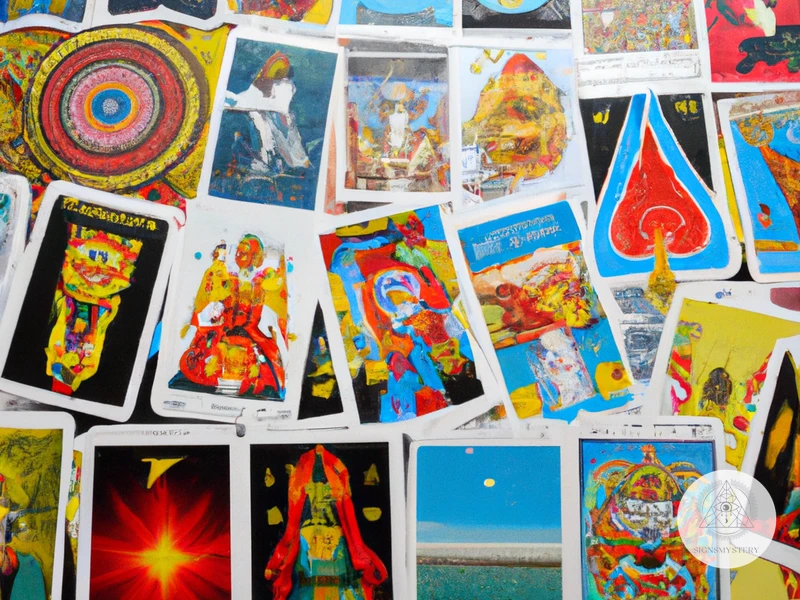
The Thoth Tarot deck is renowned for its intricate symbolism and meaningful imagery. Each card is a work of art that tells a unique story, laden with deep insights and mystical wisdom. To understand the true essence of the Thoth Tarot, it is essential to delve into the symbolism and meanings behind each card. From the Major Arcana to the Minor Arcana and Court Cards, every design and symbol has a significance that can offer profound insights into your life and consciousness. Let’s explore the inner workings of the Thoth Tarot and decode the mysteries hidden within.
The Major Arcana
The Major Arcana cards in the Thoth Tarot deck are the 22 cards that represent the archetypal elements of life. These cards carry significant meanings and symbolisms that can provide insight into one’s journey through life. Each card is represented by a number, a title, a corresponding Hebrew letter, and a visual depiction that captures the essence of the card’s meaning.
Here is a table highlighting the Major Arcana cards of the Thoth Tarot deck and their corresponding meanings:
| Card | Number | Title | Hebrew Letter | Meaning |
|---|---|---|---|---|
| The Fool | 0 | The Spirit of Aethyr | Aleph | Represents the beginning of a journey, new beginnings, and taking risks. |
| The Magus | I | The Magus of Power | Beth | Symbolizes manifestation, creativity, and willpower. |
| The High Priestess | II | The Priestess of the Silver Star | Gimel | Represents intuition, mystery, and feminine power. |
| The Empress | III | The Daughter of the Mighty Ones | Daleth | Symbolizes growth, nurturing, and creativity. |
| The Emperor | IV | The Son of the Morning | Heh | Represents structure, power, and authority. |
| The Hierophant | V | The Magus of the Eternal | Vav | Symbolizes tradition, spirituality, and conformity. |
| The Lovers | VI | The Children of the Voice | Zain | Represents harmony, love, and relationships. |
| The Chariot | VII | The Child of the Powers of the Waters | Cheth | Symbolizes willpower, determination, and progress. |
| Adjustment (Justice) | VIII | Daughter of the Lords of Truth | Lamed | Represents balance, fairness, and karmic justice. |
| The Hermit | IX | The Magus of the Voice of Power | Yod | Symbolizes solitude, inner reflection, and wisdom. |
| Fortune (Wheel of Fortune) | X | Daughter of the Flaming Sword | Kaph | Represents change, cycles, and destiny. |
| Lust (Strength) | XI | Daughter of the Mighty Ones | Teth | Symbolizes courage, passion, and inner strength. |
| The Hanged Man | XII | The Spirit of the Mighty Waters | Mem | Represents surrender, sacrifice, and letting go. |
| Death | XIII | The Child of the Great Transformations | Nun | Symbolizes transformation, rebirth, and letting go of the old. |
| Art (Temperance) | XIV | Daughter of the Reconcilers | Samekh | Represents healing, balance, and alchemy. |
| The Devil | XV | The Lord of the Gates of Matter | Ayin | Symbolizes temptation, materialism, and bondage. |
| The Tower | XVI | The Lord of the Hosts of the Mighty | Peh | Represents upheaval, chaos, and destruction. |
| The Star | XVII | TheSubscribe to Our NewsletterSign up to receive the latest news and updates. |
Tzaddi | Symbolizes hope, inspiration, and spiritual guidance. |
| The Moon | XVIII | The Ruler of Flux and Reflux | Qoph | Represents intuition, illusion, and the unconscious mind. |
| The Sun | XIX | The Lord of the Fire of the World | Resh | Symbolizes vitality, success, and happiness. |
| The Aeon (Judgement) | XX | The Spirit of Primal Fire | Shin | Represents renewal, awakening, and spiritual awakening. |
| The Universe (The World) | XXI | The Great One of the Night of Time | Tau | Symbolizes completion, fulfillment, and collective consciousness. |
Each card in the Major Arcana carries a unique and powerful energy that can provide profound insights into your life journey. Understanding the meanings of these cards can help you gain a deeper understanding of your life purpose and the lessons you need to learn along the way. Whether you’re a beginner or an experienced tarot reader, the Major Arcana cards of the Thoth Tarot deck are an excellent tool for spiritual growth and self-discovery.
The Minor Arcana
The Minor Arcana is comprised of four different suits: Wands, Cups, Swords, and Pentacles. Each of these suits represent a different element and have their own set of meanings.
Wands: The Wands suit represents the element of Fire and is associated with creativity, energy, and passion. The cards in this suit often depict scenes of growth, inspiration, and new beginnings.
Cups: The Cups suit represents the element of Water and is associated with emotions, intuition, and relationships. The cards in this suit often depict scenes of love, harmony, and inner peace.
Swords: The Swords suit represents the element of Air and is associated with intellect, communication, and conflict. The cards in this suit often depict scenes of struggle, decision-making, and intellectual growth.
Pentacles: The Pentacles suit represents the element of Earth and is associated with material possessions, money, and career. The cards in this suit often depict scenes of abundance, stability, and practicality.
Each suit in the Minor Arcana also consists of cards numbered 1 through 10, as well as four court cards: Page, Knight, Queen, and King.
Numbered Cards: The numbered cards in the Minor Arcana represent various stages of growth, challenges, and accomplishments. For example, the Ace of Wands represents the beginning of a journey or a new creative endeavor, while the Ten of Pentacles represents financial stability and a sense of community.
Court Cards: The Court Cards in the Minor Arcana represent different personality types or archetypes. The Page represents youthfulness and learning, the Knight represents action and determination, the Queen represents nurturing and emotional maturity, and the King represents authority and leadership.
When interpreting the Minor Arcana cards, it is important to take into consideration both the element and the specific suit. For example, if you draw the Five of Cups, which is associated with loss and disappointment, the Cups suit suggests that the loss is emotional in nature. On the other hand, if you draw the Five of Swords, which is also associated with conflict and loss, the Swords suit suggests that the loss is more intellectual or communicative in nature.
Reading the Thoth Tarot Deck
As you delve deeper into the world of Thoth Tarot, you may find yourself eager to explore the art of divination through tarot reading. Reading the Thoth Tarot deck is a highly nuanced and intuitive process that requires careful preparation, a clear mind, and a willingness to dive into the symbolism and meanings behind each card. In this section, we will guide you through the various aspects of reading the Thoth Tarot, from preparing for your reading to developing your interpretation skills. So, grab your deck and let’s get started on this transcendental journey of self-discovery and enlightenment.
Preparing for Your Reading
Before embarking on a Thoth tarot divination, it is important to take some time for preparation. This can help sharpen your focus, ensure you are in the right state of mind and create the right atmosphere for your reading. Here are some important steps for preparing for your Thoth tarot reading:
1. Define your Intention: Start by defining your intention for the reading. What do you want to gain from this session? Whether it is to gain clarity on a specific issue, get some guidance or simply explore your inner thoughts, it is important to have a clear intention in mind.
2. Choose the Right Space: It is important to choose a quiet and peaceful space where you won’t be disturbed or distracted. This can be your own personal space, a quiet room or a secluded spot outdoors.
3. Create a Calm Atmosphere: To create a calm and peaceful atmosphere, you can light some candles, burn some incense or diffuse essential oils. You can also play some soothing music or use meditation techniques to help you relax.
4. Choose Your Deck: Choose the Thoth tarot deck that resonates with you the most. It is important to choose a deck that speaks to you at a personal level as this can help you to connect with the cards more easily.
5. Cleanse and Shuffle the Cards: Before you begin your reading, take some time to cleanse and shuffle the cards. This helps to release any energy that may have accumulated on the cards and reset them for your use. You can also set an intention for your reading while shuffling the cards.
6. Get in the Right Mindset: Finally, before diving into your Thoth tarot reading, take some time to quiet your mind and focus on your breathing. You can do this by meditating or simply taking a few deep breaths. This can help you to connect with your intuition and be more receptive to the messages of the cards.
By following these simple steps, you can create a powerful and effective Thoth tarot reading that can offer you guidance and insight into your life.
The Art of Interpretation
The art of interpretation is a crucial skill for anyone looking to read the Thoth Tarot Deck. Interpreting the cards requires a combination of intuition, knowledge of the symbolism, and an understanding of the querent’s question. Here are some tips for mastering the art of interpretation:
- Stay Open-Minded: It’s important to stay open-minded while interpreting the cards. Don’t let your own biases or preconceived notions interfere with your interpretation.
- Trust Your Instincts: While knowledge and understanding of symbolism are important, it’s also essential to trust your instincts. Your intuition can lead you to valuable insights that may not be immediately apparent.
- Pay Attention to the Details: The Thoth Tarot Deck is full of intricate details and subtle nuances. Paying attention to these details can help you gain a deeper understanding of the cards and their symbolism.
- Consider the Context: In interpreting the cards, it’s important to consider the context in which the reading is taking place. Factors like the querent’s question, their current situation, and their emotional state can all impact the meaning of the cards.
- Embrace the Ambiguity: One of the unique features of the Thoth Tarot Deck is its ambiguity. Don’t be afraid to embrace this ambiguity and use it to your advantage. It can help you tap into your intuition and uncover hidden meanings.
- Be Respectful: Finally, it’s important to remember that the cards are a tool for guidance and self-reflection. Respect the querent’s privacy and always approach the interpretation with empathy and compassion.
By mastering the art of interpretation, you can unlock the full potential of the Thoth Tarot Deck and use it as a powerful tool for personal growth and self-discovery.
Common Spreads and Layouts
One of the most important aspects of a Tarot reading is the layout or spread you choose. There are many different spreads to choose from, each one designed to answer different types of questions or provide different types of insights. Here are some of the most common spreads and layouts used with the Thoth Tarot deck:
| Spread Name | Card Layout | Card Meanings |
|---|---|---|
| Celtic Cross | 10 cards laid out in a specific pattern | Provides deep insights about past, present, future, attitudes, obstacles, and more |
| Three-Card Spread | Three cards laid out in a row | Answers simple questions about past, present, future or mind, body, spirit |
| Horseshoe Spread | Seven cards laid out in a horsehoe shape | Provides insights about the past, present, and future related to a specific question |
| One-Card Spread | A single card drawn from the deck | Answers a simple question or provides insight about a specific situation or energy |
| Relationship Spread | A spread consisting of up to six cards designed to provide insights about romantic relationships | Provides insights about the past, present, future, and possible outcomes of a romantic relationship |
| Chakra Spread | A spread consisting of seven cards aligned with the seven chakras of the body | Provides insights about the energy centers of the body and how they relate to a specific situation or question |
It’s important to choose a spread that matches the question or situation you are seeking guidance on. For example, if you have a simple yes or no question, a one-card spread may be the best choice. If you are seeking guidance about a complex situation, a more in-depth spread like the Celtic Cross may be more appropriate.
Whatever spread you choose, remember that interpretation is key. Be open to the insights and meanings of the cards, and trust your intuition to guide you to the answers you seek.
How to Develop Your Reading Skills
The ability to read Thoth Tarot decks effectively requires a significant amount of practice and patience. Fortunately, there are several strategies that you can use to develop your reading skills and become more confident in your interpretations of the cards. Here are some tips for developing your reading skills:
- Study the cards: Begin by familiarizing yourself with the symbols and meanings associated with each card. Spend time studying the artwork and reflecting on the various interpretations of the cards. Take notes on your impressions, associations, and insights. Consider joining a study group or taking a class on tarot interpretation to deepen your understanding of the deck.
- Practice readings: As with any skill, practice is key to developing your reading skills. Begin by performing readings for yourself and close friends or family members. Keep a journal of your readings, noting the cards drawn and your interpretations. Reflect on how these interpretations relate to your current situation and the events taking place in your life.
- Get feedback: Seek feedback from other experienced readers to hone your skills. Offer to exchange readings with other learners to gain insight into different styles and interpretations. Collaborate with fellow students to develop your understanding of the cards and how to apply them in practice.
- Stay open-minded: It is important to remain open-minded when reading the Thoth Tarot. Avoid becoming too attached to any particular interpretation or symbolism. Instead, remain curious and explore alternate perspectives to deepen your understanding of the cards and their meaning.
- Keep learning: Continue to learn and explore new aspects of the Thoth Tarot. Attend workshops or conferences, read new books or articles, and seek out different perspectives on the cards. Consider expanding your knowledge of other tarot decks as well, further developing your ability to read and interpret the symbols and meanings of tarot cards.
- Trust your intuition: Finally, trust your intuition when performing readings. It is important to balance your rational mind with your intuition. Try not to overthink your interpretations or rely too heavily on traditional interpretations. Allow your intuition to guide you and use the cards as a tool for accessing your inner wisdom and insight.
By following these tips, you can develop your reading skills and become a more confident and effective tarot reader. Remember, the key to success is to remain curious, practice consistently, and trust in yourself and the cards.
Conclusion
In conclusion, the Thoth Tarot Deck is a unique and powerful tool for exploring the mysteries of the universe and of the self. It offers a rich tapestry of symbols, archetypes, and meanings that can be endlessly interpreted and understood in new ways. The deck is the result of the visionary insight and creative genius of Aleister Crowley, whose life and legacy continue to inspire and challenge people around the world.
Whether you are a seasoned practitioner of divination and esotericism or a beginner just embarking on your journey, the Thoth Tarot Deck has much to offer. Its cards can be used for basic or complex readings, for meditation or ritual, or simply for contemplation and insight.
As you work with the Thoth Tarot Deck, you will discover its many unique features, such as its intricate design, deep symbolism, and intense colors. You will also encounter the personalities and energies of the individual cards, from the archetypal figures of the Major Arcana to the everyday situations and emotions of the Minor Arcana and Court Cards.
At the heart of the Thoth Tarot Deck is the idea that every human being possesses a unique spark of divinity and creativity, which can be realized through spiritual practice and self-knowledge. By using the deck as a tool for exploring the inner depths of your psyche, you can gain a greater understanding of your strengths, weaknesses, hopes, and fears.
In conclusion, the Thoth Tarot Deck is a powerful and transformative tool for exploring the mysteries of the universe and of the human psyche. By working with it in a spirit of curiosity, respect, and self-reflection, you can unlock a greater awareness of yourself and of the world around you. So pick up a deck today and start your journey!
Frequently Asked Questions
What is the history behind the Thoth Tarot Deck?
The Thoth Tarot Deck was created by Aleister Crowley in the mid-1940s while he was living in the United States, with art by Lady Frieda Harris. It was first published in 1969.
How does Thoth Tarot differ from other Tarot decks?
Thoth Tarot has a complex symbolism and an esoteric system of correspondences that make it different from other Tarot decks. It also has a unique approach to the interpretation of the cards.
Who was Aleister Crowley?
Aleister Crowley was an English occultist, writer, and ceremonial magician, who was also known as the Great Beast or the Wickedest Man in the World. He was a prominent figure in the 20th century occult movement.
What is the philosophy behind Thoth Tarot?
The philosophy behind Thoth Tarot is based on Crowley’s Thelemic teachings, which emphasize the individual will, the pursuit of one’s True Will, and the attainment of spiritual enlightenment. The deck is designed to reflect the path of spiritual development.
What are the major and minor arcana cards in Thoth Tarot?
The major arcana cards in Thoth Tarot are 22 cards that represent archetypal principles and significant events in a journey of spiritual development. The minor arcana cards are split into four suits, which represent aspects of daily life and correspond to the elements of air, earth, fire, and water.
What are the court cards in Thoth Tarot?
The court cards in Thoth Tarot are equivalent to the face cards in a standard deck of playing cards. Each of the four suits has three court cards: Knight, Queen, and Prince (King).
What are the unique features of Thoth Tarot?
The unique features of Thoth Tarot include its intricate symbolism, esoteric system of correspondences, and the use of color to convey meaning. The deck also incorporates ancient and modern mythologies, as well as elements from various cultures and spiritual traditions.
How can I use Thoth Tarot for divination?
Thoth Tarot can be used for divination by drawing cards from the deck and interpreting their meaning based on their symbolism and correspondences. There are various spreads and layouts that can be used for different types of readings.
How do I choose my first Thoth Tarot deck?
When choosing your first Thoth Tarot deck, consider the artwork, printing quality, and the guidebook that comes with it. You may also want to choose a deck that resonates with you on a personal and intuitive level.
How do I prepare for my Thoth Tarot reading?
Before doing a Thoth Tarot reading, it’s important to ground yourself, set your intention, and create a sacred space. You may also want to meditate, shuffle the cards, and focus on your question or issue before drawing the cards.



